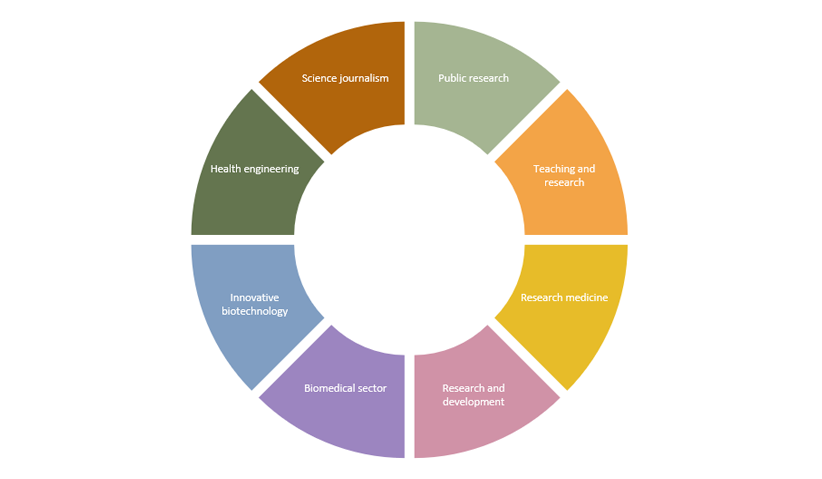
Graduate Program in Life Sciences
The Graduate Program offers a comprehensive curriculum of advanced study and research, from the Master's to the Doctorate degree, in the life sciences. Through its association with PSL research laboratories, five Laboratories of Excellence (LabEx) and PSL’s Q-LIFE Institute, the graduate program offers Master’s degrees in which research plays a central role. Students may also choose elective courses designed to improve their transdisciplinary skills and broaden their curriculum.
Key figures
Subjects
Genomics, Systems, Biology and Evolution
Cell and Developmental Biology
Neurosciences
Immunology and Microbiology
Engineering for Health
Biology for Health
Biophysics
Bioinformatics
A five-year track from Master’s to PhD
Upon entering the Master’s degree program, each student will define their scientific project with the graduate program's faculty and researchers. Students will have an academic advisor and will be heavily involved in research throughout the program.
Choose your Master’s degree and define your academic path
The graduate program offers the following Master’s degrees:
Pursue a PhD
Doctoral research is conducted in a PSL laboratory. Training is conducted in a doctoral school.
Graduate program doctoral schools
- Brain, Cognition, Behavior Doctoral School - DS 158
- Bio Sorbonne Paris Cité Doctoral School - DS 562
- Cancerology: Biology, Medicine, Health Doctoral School - DS 582
- Doctoral School of the Complexity of the Living Organism - DS 515
- École Pratique des Hautes Études (EPHE) Doctoral School - DS 472
- Doctoral School of Medication, Toxicology, Chemistry, Imaging - DS 563
- Structure and Dynamics of Living Systems Doctoral School - DS 577
- “Frontières de l’Innovation en Recherche et Éducation” Doctoral School - DS 474
- Hematology, Oncogenesis and Biotherapies Doctoral School - DS 561
- Signaling and Integrative Networks in Biology Doctoral School - DS 568
Graduate program laboratories
- Signaling, Radiobiology, and Cancer - UMR 3347-U 1021
- Genome Integrity, RNA and Cancer - UMR 3348
- Chemistry and Modelling for the Biology of Cancer (CMBC)
- Bioinformatics, Biostatistics, Epidemiology and Computational Systems. Biology of Cancer
- Immunity and Cancer - U932
- Genetics and Developmental Biology - UMR 3215-U 934
- Dynamics of Genetic Information - UMR 3244
- Nuclear Dynamics - UMR 3664
- Cell Biology and Cancer - UMR 144
- Physico-Chimie Curie Lab - UMR 168
- CHIP (Cancer, Heterogeneity, Instability, and Plasticity) - U 830
- Cellular and Chemical Biology - UMR 3666-U 1143
- Bioinformatics, biostatistics, Epidemiology and Computational System. Biology of Cancer - U 900
- Chloroplast Biology and Light-sensing in Microalgae - UMR 7141
- EGM (Microbial Gene Expression) - UMR 8261
- Laboratory of Theoretical Biochemistry - UMR 9080
- Laboratory of Physical and Chemical Biology of Membrane Proteins - UMR 7099
- Laboratory of Molecular and Cellular Biology of Eukaryotes - UMR 8226
- Institute for Physical-Chemical Biology - FR 550
- IAB (Institut pour l'Avancée des Biosciences) - UMR 5309
- IMS (Intégration du Matériau au Système) - UMR 5218
- ICGM (Institut de chimie moléculaire et des matériaux) - UMR 5253
- Mécanismes moléculaires dans les démences neurodégénératives - UMR_S1198
- Gustave Roussy Institute
- INCIA (Institut de Neurosciences Cognitives et Intégratives d'Aquitaine) - UMR 5287
- ICM (Institut du Cerveau et de la Moelle épinière) - UMR 7225-UMR_S1127
- IVPC (Infections Virales et Pathologie Comparée) - UMR 754
- LIIC (Laboratoire d'Immunologie et Immunothérapie des Cancers) - EA 7269
- LGBC (Laboratoire de Génétique et Biologie Cellulaire) - UR 4589
- CHArt (Cognitions Humaine et Artificielle) - EA 4004
- Institut du thorax - UMR 1087
- CRSA (Centre de Recherche Saint-Antoine) - UMR S938
- Neuropsychologie et Imagerie de la Mémoire Humaine - UMR S1077
- Intégrité du Génome et Cancer-Institut Gustave Roussy - (UMR 9019)
- Immunologie humaine, physiopathologie et immunothérapie - (UMR S976)
Enhance and customize your academic path: elective courses
Complementary university-wide courses
Graduate program students at both the Master’s and PhD level have access to university-wide trainings in core competencies, both introductory and advanced, designed to supplement their academic study.
Those complementary university-wide courses, available in all of PSL’s component schools, are eligible for ECTS credit.
Data Science Program
Career opportunities
Trained in and through research, PSL alumni find numerous employment opportunities in the public, private and entrepreneurial sectors as well as in the academic world.

Contact
Graduate Program Director:
Terence Strick (ENS - PSL)
gp-lifesciences@psl.eu






